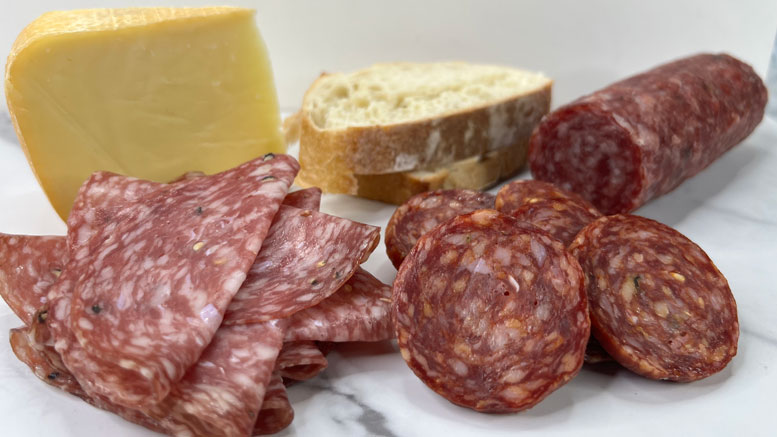All-Natural Deli Meats
January 10, 2024 | 7 min to read
Consumers are increasingly discerning about food choices, leading to a rise in demand for all-natural deli meats. Experts like Oliviero Colmignoli highlight this growing preference, as shoppers focus on health benefits and ingredients. Technavio's research confirms that the organic and natural deli meat market will expand over the next five years. Many consumers, motivated by pricing and health factors, are gravitating towards products labeled all-natural, which often excludes artificial ingredients, despite the FDA's lack of a strict definition for "natural".

Natural ‘answers the call’ from discerning, health-conscious consumers
Consumers have become more discerning in recent years, paying closer and closer attention to the details about the foods that they eat. Diets are more specific, and shoppers are more likely to stop and study ingredients closely before making a purchase. As a result, new offerings that emphasize health benefits and less processing in foods are making increasing headway and finding more prominent places on grocery store shelves.
In the deli meat category, all-natural meats have long been a product type to watch, and its importance to the industry is only becoming more apparent each year.
“Consumer demand for all-natural meat products in the deli category has been steadily growing for many years,” says Oliviero Colmignoli, president and founder of Olli Salumeria, Mechanicsville, VA.
According to research from Technavio, the rising demand for organic and natural deli meats is a key trend in the overall deli meat market today, driven by greater awareness among consumers of their health benefits. In fact, the rising demand for organic and natural meats is expected to support the growth of the global deli meat market during the next five years, according to Technavio.
In North America, “many vendors are introducing innovations in their product offerings to capitalize on emerging trends. They are offering new natural flavors and textures to maintain consumer interest. Such factors will propel the growth of the regional market,” according to Technavio.
Francis Yupangco, executive director of marketing, Godshall’s Quality Meats, Souderton, PA, says many consumers seek all-natural deli meats. In fact, meats that are branded all-natural can hit the sweet spot for many shoppers who are weighing the health benefits of foods alongside the price of them.
“All-natural meats continue to [have] the strongest product claim with consumers,” says Yupangco. “This rings true more so today as rising prices for antibiotic-free and organic meat products have made some consumers ‘trade down’ to products labeled simply with all-natural.”
A GROWING EMPHASIS ON ALL-NATURAL
Alexandra Groezinger, president of Alexian Pate, Neptune, NJ, says “all-natural” usually refers to products that are made without the use of artificial ingredients such as colors, fillers or additives. The Food and Drug Administration does not have a formal definition for the term “natural,” but does have a longstanding policy that the organization “has considered the term ‘natural’ to mean that nothing artificial or synthetic (including all color additives regardless of source) has been included in, or has been added to, a food that would not normally be expected to be in that food.”

Different purveyors might use all-natural differently, says Yupangco.
“All-natural, or minimally processed meat is a relatively broad claim,” says Yupangco. “However, in the turkey bacon category, our all-natural and uncured products with just five or six simple natural ingredients truly speaks to the spirit of what all-natural meat should be.”
Yupangco believes that Godshall’s approach to all-natural meat resonates strongly with today’s consumers. “We have continued to experience exponential growth in our all-natural uncured products with just five or six simple natural ingredients,” he adds.
“As the world’s largest turkey bacon producer and America’s third largest turkey bacon brand, Godshall’s has benefited from our line of all-natural products,” Yupangco continues. “Godshall’s is the only major turkey brand that has seen sales growth and increased household penetration in 2023. Our well-priced and premium all-natural products have continually taken double-digit share away from legacy brands that sell artificially cured or antibiotic-free turkey bacon.”
Similarly, Colmignoli says Olli Salumeria’s success is closely intertwined with its commitment to natural ingredients.
The ‘all-natural’ category has continued growth because more consumers are dem anding transparency in ingredients.
“At Olli Salumeria, we have only used the finest natural ingredients, such as 100% vegetarian-fed, antibiotic-free and hormone-free pork,” says Colmignoli. “We truly believe that quality ingredients and careful attention to the curing process are the secrets behind the world’s best salami — and customers can taste the difference.”
Alongside consumers’ strengthened focus on all-natural ingredients, Colmignoli says there also has been a major increase in demand for clean-label products, which are products that use as few ingredients as possible.
“Consumers are increasingly aware of the health impact of certain food ingredients and demand a higher level of transparency in packaged foods, seeking options that are minimally processed and made with simple, honest ingredients,” says Colmignoli.
“Consumers are increasingly aware of the health impact of certain food ingredients and demand a higher level of transparency in packaged foods, seeking options that are minimally processed and made with simple, honest ingredients.”
— Oliviero Colmignoli, president and founder, Olli Salumeria
With that in mind, Colmignoli says Olli Salumeria “answered the call” for more clean-label products with the development of the industry’s first preservative-free salami formula.
“Our growth as a company relies on the quality of our products, so we remain committed to innovation and technology that allow us to produce a clean-label product without compromise to flavor,” says Colmignoli. “Olli’s proprietary curing process is a revolutionary step for modern salami making.”
While salt is the primary ingredient used for curing and preserving salami, for many decades, salami makers have relied on nitrates and nitrites as added preservatives.
“However, Olli Salumeria has developed a simple salt cure that eliminates the need for added nitrates and nitrites, producing a salami that is effectively free of preservatives,” Colmignoli says. “We first introduced this groundbreaking curing process with our Olli Salamini snack line, and we are expanding preservative-free to other Olli products, including salami chubs.”
MARKETING AND MERCHANDISING
The surging consumer interest in charcuterie boards in recent years has proved to be a boost for the deli meats market in general, but it has especially bolstered the all-natural deli meat category.
Alexian Pate’s Groezinger says charcuterie boards are “a fun, creative and inviting way to enjoy meats and cheeses.”
“They make the category more approachable and are encouraging consumers to try more than ever before,” she says.
Colmignoli agreed that charcuterie plays a prominent part in the deli meats market.
“Charcuterie has been a major trend for several years, after initially growing popular during the pandemic as consumers sought exciting, premium foods at home,” says Colmignoli. “This trend led to increased interest in charcuterie boards, which encouraged a lighter, less entrée-focused approach to meals — all fueled by social media content on Instagram, Pinterest and TikTok, which boosted awareness of charcuterie and shared creative preparation and serving ideas.”
Charcuterie often is brought into merchandising opportunities for all-natural deli meats, says Groezinger.
“The charcuterie board craze has encouraged deli and specialty cheese departments to add complementary products to the meats and cheeses they sell,” says Groezinger. “For example, there are more specialty crackers, jams and chutneys, honeys, mustards, nuts and more being cross-merchandised in these areas. Selling higher-end cheeses and meats alongside higher-end accouterments makes perfect sense.”
As consumers became more comfortable with charcuterie boards, they developed more interest in the foods they first tasted on a board.
“Consumers became more familiar with the robust flavor of charcuterie favorites such as Italian-style salami, artisanal cheese and other accompaniments, but interest grew in enjoying these foods in portable snack form with great demand for convenience in deli meats,” says Colmignoli. “Whether it’s grab-and-go snack packs, or pre-packaged charcuterie antipasto trays, consumers want to make the process of enjoying salami and other deli favorites easy, and that’s what has had the greatest impact on the segment.”
Colmignoli says Olli responded to the growing demand for grab-and-go charcuterie with its line of Olli Snack Packs, which pair its slow-cured Italian-style salami with high-quality cheeses and artisanal crackers in a convenient 2-ounce package.
“More recently, we introduced the Olli Salamini line of bite-sized salami sticks, which offer 2.6 ounces of bite-sized salami sticks in a resealable bag and are available in bold flavors like Smoked, Pequin, Bourbon and Classic,” says Colmignoli.
Packaging can play an important part in the marketing and merchandising of all-natural deli meats.
“Simple, clean-looking packaging adds to the cachet of all-natural products,” says Yupangco. “For Godshall’s, we further differentiate ourselves with a unique die-cut bacon board that prominently shows a beautiful plated food shot that stands out on the shelf.”
Colmignoli noted that one of salami’s appeals to grocers has always been that it is one of the few deli meats that does not need to be refrigerated in the grocery store. That holds true for all-natural salami products, too.
“Savvy retailers have taken advantage of the versatility and long shelf life of salami through secondary displays that go beyond the refrigerated deli section, a trend that we’re seeing more frequently and expect to continue in the future,” says Colmignoli. “Placing salami in other store sections that feature classic pairings, such as crackers, cheese or wine is an effective way of reminding customers about the possibilities of salami.”
Colmignoli says Olli offers a “robust” variety of secondary display opportunities for its shelf-stable products.
Groezinger says all-natural meats have clear staying power in the deli marketplace.
“This category has continued interest and growth because consumers demand more transparency in ingredients and the making of products,” says Groezinger. “People are more concerned with what they put in their bodies, so it always sits better when the ingredients on the label are words you can pronounce, foods you easily recognize, and are things you would find in your pantry or refrigerator.”
71 of 76 article in DeliBusiness Winter 2023-2024


